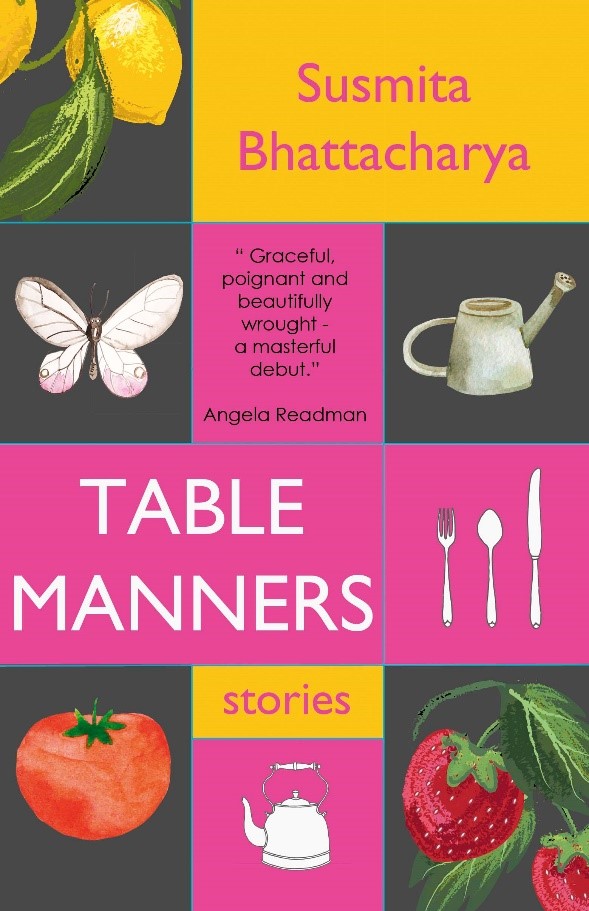You have no items in your cart. Want to get some nice things?
Go shoppingThe characters in Susmita Bhattacharya’s collection, Table Manners, are alienated by language, culture and geography, silenced by loneliness and yearning. Food is a byword for class, loss, happiness, and a minefield of potential gaffes for the culturally uninitiated. Food is also the thread that connects Indian, Bangladeshi, Chinese and Somalian immigrants with Cardiff’s indigenous residents, who despite differing geographies, all have one foot in the familiar and the other in uncharted territory.
In “That Face, Like a Harvest Moon”, the simmering meats and stinging onions are a wormhole to the past, bittersweet with longing, as a grandmother savours the rare experience of sharing kitchen space in her daughter’s house, only to subsequently discover food makes her feel sick when an unwanted pregnancy in the family occurs. An onion sliced into four chunks becomes a symbol of both poverty and lust in “The Taste of Onions on his Tongue” as the housebound narrator spies on a neighbouring couple from behind her window.
“Comfort Food” is a gem of a story, recounting a wife’s pleasure in preparing and anticipating her favourite chicken rice, only to be summoned to a restaurant for a business dinner by her husband. The restaurant with its scalloped dumplings, Octopus fritters and steamed spare ribs becomes a theatre set where each course exposes the power imbalances between partners and spouses. Finally, at the end of the evening, as the wife returns to her kitchen, Bhattacharya records with great empathy, the small comforts to be found in a lonely marriage.
But, it is in “Table Manners”, the title story, in which an elderly Chinese lady makes soup for a widowed neighbour, that food moves beyond metaphor to offer a lifeline, transcending cultural and language barriers more compellingly than words ever could, and serves as a timely reminder that it is usually wise to suspend our judgements.
The stories in this collection are deftly constructed and executed with confidence and surgical precision. Bhattacharya is at her strongest on the interior life, the misunderstandings and hairline cracks of families; the baby with black kohl eyes to ward off evil, the husband who only liked Twinings tea. At its best, her writing brilliantly reveals entire worlds in a paragraph. In “Growing Tomatoes”, we learn: “Cardiff was nothing like Mogadishu. And yet, it was everything like it. It confused Hoda. It has the same activities of daily life. Husbands to please. Food to be cooked. Clothes to be washed. But everything here had a substitute including husbands. They were called partners, ready meals and washing machines. Hoda did not trust any of them.”
Regrettably, these insights are all too rare. The hushed-up domestic violence, English lessons, chicken kormas, caustic mother-in-laws, and cooking smells leaking into the street often seem overly familiar – perhaps because so many writers have latterly documented the immigrant/outsider experience, these observations appear commonplace rather than curious? Yet don’t be deterred. There are real gems to be found in this collection – “Comfort Food”, “Growing Tomatoes”, “A Holiday to Remember”, and “The Taste of Onions on his Tongue” – worth reading for these alone.
Table Manners is out now from Dahlia Publishing.

About Christina Sanders
Chris Sanders has been writing short stories for over ten years. She has been published in: Writing Women, Quality Women’s Fiction, Peninsular and TQF. In 2011 she won an Arts Council bursary to appraise her first novel, and has contributed to various Arts Council writing projects. At present she is working to complete a collection of short stories on the theme of ‘Compromise.’ Chris Sanders holds a Masters in Education, and is currently working with women from BME communities in Hastings to use storytelling as a way to explore identity and heritage.





